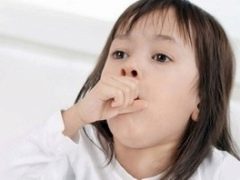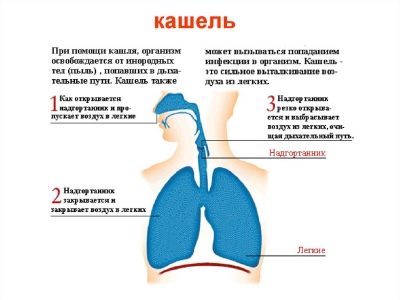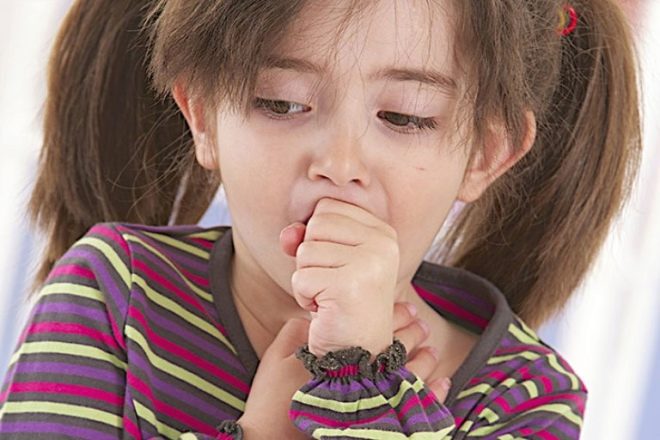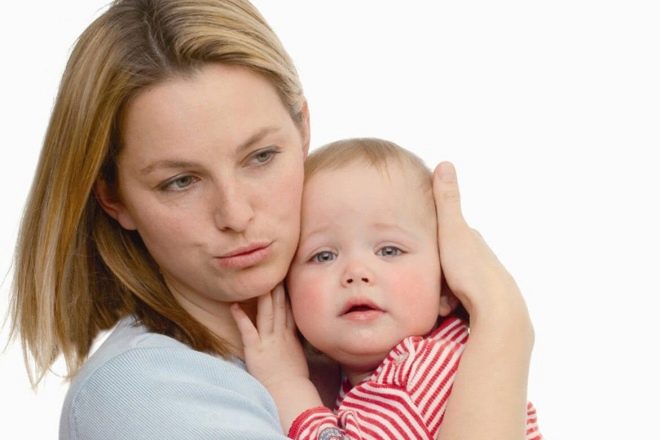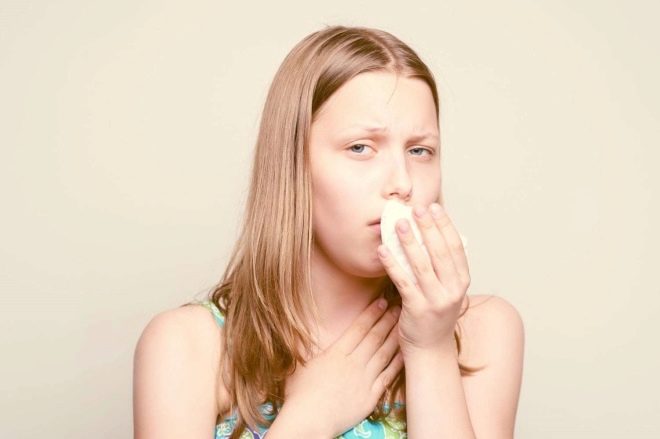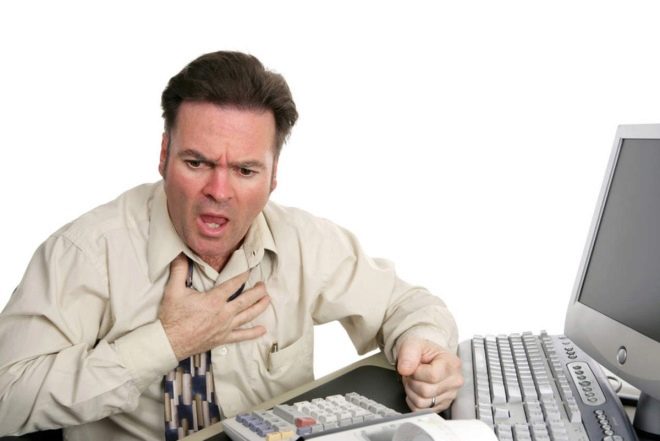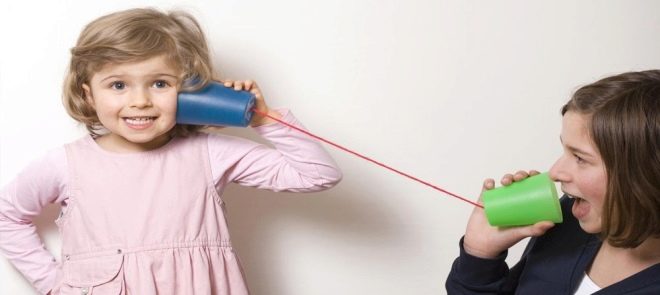Psychosomatics cough in children and adults
The cough itself does not appear, it always has a reason. And this concerns not only the traditional medical approach, which considers coughing as a symptom, and not as a separate disease, but also psychosomatic medicine, which believes that people develop cough with certain psychological and psychogenic factors.
In this article, we will look at the psychosomatic causes of cough and explain how to treat it in children and adults.
General information
Everyone coughs at the same frequency with coughing - both adults and children. But children cough more often, and traditional medicine believes that the case is in the congenital narrowness of the children's respiratory tract. Cough is a symptom that manifests as forced expiration through the mouth. The muscles of the respiratory tract are reduced by the signal of irritated receptors. The cough involves the receptors of the nose, pharynx, trachea and bronchi, pleura.
The role of cough is difficult to overestimate: with this unconditional protective reflex, the body tries to get rid of everything that interferes with normal breathing in the airways. By coughing, the human body tries to expel phlegm, pus, blood, foreign bodies, which include dust, food particles, from the paths. Therefore, the patient's complaints about coughing are always regarded by the doctor as a signal to active diagnostic actions: until the cause of the symptom is detected, no treatment will be prescribed.
Psychosomatic causes
Pay attention to the physiological meaning of the existence of cough - it is protection, release from unnecessary, interfering with normal breathing. From a psychosomatic point of view, coughing has the exact same meaning..
The respiratory organs symbolize the connection of a person with the outside world. Moreover, this relationship should be exclusively mutual - inhale (information from the world is accepted), exhale (something is given to the world).
Impaired normal breathing due to forced expirations - the attempt of a person to give something that painfully torments him inside, which he cannot say in wordsexpress the action. Then the subconscious part comes into play, which closely monitors that a person survives in any situation and activates a cough to bring out what is so annoying inside.
It is very simple to recognize a psychosomatic cough: the doctor does not find a single reason why a person can cough (tests are normal, X-rays do not show pathological changes in the lungs). Here it is necessary to turn to psychosomatic values. Either the reason was found, but the treatment does not help, or the cough returns very often. All of these situations should suggest that the true reason lies somewhere outside the lungs.
Quite often, a cough begins to torment people who have achieved a great deal - they have achieved a position, a position in society, they live with a sense of their own unique and significant, as a result all those who live in the outside world become, in his opinion, less worthy of attention.
The exhalation is disturbed, various pathologies of the respiratory organs develop, which manifest themselves in different ways, and the only common symptom for all groups of respiratory ailments is coughing.
Cough and various respiratory system ailments people who do not want to take new things from the world, who are trying to grasp the old, familiar. Thus, retirees who do not accept the idea of paying for utility bills via the Internet and prefer to stand for hours with a receipt at the post office often come to the therapist with cough complaints than those who are happy to comprehend all the new items of the modern world.
Cough up more often and those who live high ideals, dreams, resulting in often disappointed. They see the world not as it really is, and the contact, the interaction with it brings pain to the person — exhalations become more frequent, breaths become more superficial, the disease begins with coughing. History knows many striking examples of such adults; pulmonary pathologies such as consumption (tuberculosis) in the Decembrist era, in the troubled revolutionary years, were especially common.
Look into the faces of the great revolutionary figures — they are all rather thin, have sunken cheeks, inflamed eyes. They lived with high ideals that they believed in, and the world around them did not bring them satisfaction and joy. As a result, almost all of them suffered from diseases of the bronchi and lungs and suffered from long-term, plaguing cough.
Think of the Turgenev ladies: coughs and diseases of the respiratory organs are also characteristic of those who are not going to make revolutions and coups, but simply live in a fictional world, in the world of their own dreams and dreams. These exalted people can be very educated, intelligent, well-read, but they absolutely do not want to "breathe" the outside world in the form in which it exists. An annoying cough begins.
Cough often start to suffer and people who find themselves in something concrete, often in religion. They not only get joy because they believe, it is vital for them that all their relatives and friends, neighbors and work colleagues began to rejoice. Therefore, they begin to impose their faith and its dogmas on the whole world, and, encountering incomprehension and rejection from those around them, will enter into an agonizing cough.
Psychoanalysts have paid attention to this detail: when a person has something to say, but he prefers to remain silent for some personal reasons, he begins to cough almost immediately.
Words and thoughts become a barrier to free breathing, the exchange with the world is disturbed.
If the interlocutor coughs at the moment you tell him something, psychologists believe that this is a sign of his apparent disagreement with your opinion, but he cannot voice his own.
In children
Cough in children, in psychosomatics, is quite often psychogenic. That is, neither the pediatrician nor the ENT detect any reason for it. Often psychogenic cough is called allergic. But even if the child often has bronchitis, laryngotracheitis, there are bouts of severe cough, The psychology of childhood diseases must be studied, it will help to quickly solve the problem and save the child from an unpleasant symptom.
Living in a fantasy world is normal for children in general. They constantly invent something, endow the toys with magical properties, spiritualize them, imagine something and live in this wonderful world quite comfortably.
Imagination and fantasy are important conditions for the development of a child’s psyche at certain stages. When adults understand this and support fiction, take part in this “world”, children rarely develop problems with the respiratory system.. The opposite happens if adults start roughly “breaking wings” of a dream: “don't compose”, “don't invent”, “it doesn't happen”, “there are no wizards”, “don't deceive”, “the dwarfs could not scatter toys in your room” etc.
The more an adult tries to “land” the fantasizing child, the more the child tries to isolate himself from the adult, to hide his fictional world from him, not to show it, to live in it separately. The stronger the baby builds a wall, the higher the likelihood of developing a strong psychogenic cough.
Such children do not understand how to contact the real world, do not find a compromise, and very serious respiratory diseases, such as bronchial asthma, are often formed on this basis. If the condition of the child is accompanied by a strong offense, then the development of pneumonia, cancer of the lung is possible.
If parents complain that the child is constantly coughing, he has “weak lungs”, it is necessary to assess the degree of trust in this family and find out how much the interests of the child are taken into account. If his high aspirations do not find support, if all the topics of conversations in the family are reduced only to money, material values, if the spiritual does not attach any importance, then there is nothing to be surprised that the child is suffocated by a strong dry cough, unproductive, not bringing any relief.
Another category of coughing children is the children of rich parents.. Often they grow up without any need for anything, they have all the best, everything their peers from ordinary families, classmates can only dream of. As a result, the child forms a special relationship to the material, and with it to the rest of the children. They treat their peers at best, condescendingly, they feel taller and better, literally people of another sort, higher. This is how chronic respiratory diseases are formed - the world is becoming “second-rate”, it’s not very pleasant to breathe in it.
Small children suffer from coughing and respiratory diseases for a more banal and obvious reason. The parents themselves, who surround the child with such hypertrophied care, prevent them from breathing normally, so that they cannot calmly breathe.. They decide for him what to wear and what to eat, they do not ask him what he wants, the parents, they say, know better what will be for the good of the child.
With a cough, the child tries to “shout” to them, encourages them to listen to his opinion already, to ask what he can say to them. Even if the baby is still breastfeeding and does not speak, he coughs and expresses his disagreement with something.
Separately, you need to talk about quite common situations of incomprehensible frequent cough in children who grow up in love and care. Mom, dad, grandmothers, grandfathers sometimes adore the baby so much (this often happens in the case of long-awaited children born at a later age) that they immediately make the crumbs the main family member, and themselves the attendants. The life of the whole family is subject to the interests of one man - a child. Parents look at any problem from the point of view of how acceptable it is for Nastya, Kolenka, Sasha.
Like a bolt from the blue, pulmonary diagnoses usually sound to them - how can that be? After all, a child is so closely watched, he is given only the best products, he is protected from drafts! And the matter is not at all in microbes, not in cold, not in vitamins, but in the fact that the world around us perceives the child “god” as something less valuable than himself. Inhaling it becomes not too pleasant.
Teens often cough to react to stress and resentment.. They did not appreciate the first love, did not reciprocate - an insult occurred and bronchitis developed. It is impossible to take that place in a society of contemporaries of which it is dreamed - the insult arises, pneumonia develops. Parents do not understand, there is no feeling of unity at home, support - again, resentment and frustration develop, tracheitis, bronchitis or pneumonia begins.
Psychogenic cough
Cough, which generally develops without prerequisites (in the absence of disease, which is confirmed by tests), needs some clarification. In adults, it is often in addition to the above factors for the development of pulmonary ailments, it is caused by a great desire to attract attention to oneself if it cannot be done by other means.
Very sensitive people, with an alarming mentality, with a tendency to blame themselves for everything, they can cough "punish" themselves for the failures that happened, in their opinion, because of themselves.
People who have long been accumulating irritation due to the fact that they are forced to perform duties that they have in mind, but they cannot say this openly (for example, because of fear of losing their job, losing relationships, etc.), they may suffer from a long chronic psychogenic cough. They will explain to those around him anything: allergy to dust or cats, smoking, harmful work, etc.
Usually a change of activity has a beneficial effect on health, and the cough stops.
How to find the cause and recover?
It’s worth starting with an analysis of your own feelings and emotions: check if there is any hidden resentment, irritation at someone or some recent events, if you are not silent about something that is already overdue and asks to be expressed. Alone with yourself you can not be shy, so it is important to answer yourself as honestly as possible if you have at least one of the factors described above that predispose to psychogenic cough.
Answers to these questions will be at the same time the key to healing. If there is an insult, you need to forgive, if you have something to say to the annoying chief dictator, tell him that, anyway, with the work that causes a painful psychogenic cough, you need to leave so as not to bring yourself to cancer problem.
If the problem in the family and the actions of your relatives “crush” you, do not allow you to breathe, try to say it, tell them, it will be more likely that you will be understood and something will change. A cough will pass almost immediately after you decide to tell the truth.
Given the variety of causes of child cough, it is important to watch a child, if he is already big enough, you can talk with him using the same questions: “who are you offended”, “who prevents you from telling the truth”, “what you don’t like in the outside world " etc.
Pay attention to additional symptoms: sore throat means severe irritation that a child or an adult is experiencing, loss of voice, hoarseness - prohibition to speak, cough with abundant sputum - an old, offensive insult, which has already begun to leave, in parts, gradually.
Treatment depends on the cause, it is important to eliminate it. If a child is excessively spoiled and raised to a pedestal, you need to gently remove it from there, if he is a dreamer, support his dreams, draw with him his fictional space warriors and be happy together, because the cough will recede.
It will be somewhat more difficult to cure the cough of Tychoni, who is not used to talking about his offenses, it is possible that the help of a psychologist may be needed.
Psychologist Louise Hay proposes curing positive affirmationswhich will help to change the hostile attitude towards the world for a benevolent one: “The world loves me and accepts, I accept everything in this world with love and respect.”
Psychotherapist Valery Sinelnikov offers techniques for working with the subconscious, into which a person himself may well settle a new program - positive thinking, it will help to change the real attitude to the world and cure cough.
Psychotechniques to work with anger and irritation, motivational therapy, relaxation swimming lessons, yoga, finding joy in small things are useful, so that a person can enjoy breathing in and out without agonizing coughing spasms.
For more information on psychosomatics cough in children and adults, see the following video.
